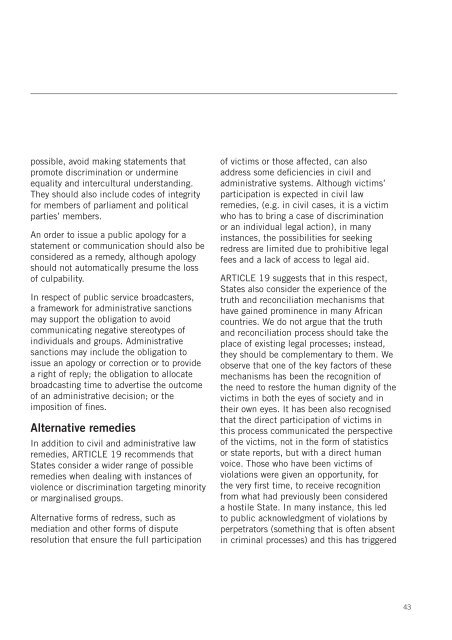ARTICLE-19-policy-on-prohibition-to-incitement
ARTICLE-19-policy-on-prohibition-to-incitement
ARTICLE-19-policy-on-prohibition-to-incitement
You also want an ePaper? Increase the reach of your titles
YUMPU automatically turns print PDFs into web optimized ePapers that Google loves.
possible, avoid making statements that<br />
promote discriminati<strong>on</strong> or undermine<br />
equality and intercultural understanding.<br />
They should also include codes of integrity<br />
for members of parliament and political<br />
parties’ members.<br />
An order <strong>to</strong> issue a public apology for a<br />
statement or communicati<strong>on</strong> should also be<br />
c<strong>on</strong>sidered as a remedy, although apology<br />
should not au<strong>to</strong>matically presume the loss<br />
of culpability.<br />
In respect of public service broadcasters,<br />
a framework for administrative sancti<strong>on</strong>s<br />
may support the obligati<strong>on</strong> <strong>to</strong> avoid<br />
communicating negative stereotypes of<br />
individuals and groups. Administrative<br />
sancti<strong>on</strong>s may include the obligati<strong>on</strong> <strong>to</strong><br />
issue an apology or correcti<strong>on</strong> or <strong>to</strong> provide<br />
a right of reply; the obligati<strong>on</strong> <strong>to</strong> allocate<br />
broadcasting time <strong>to</strong> advertise the outcome<br />
of an administrative decisi<strong>on</strong>; or the<br />
impositi<strong>on</strong> of fines.<br />
Alternative remedies<br />
In additi<strong>on</strong> <strong>to</strong> civil and administrative law<br />
remedies, <str<strong>on</strong>g>ARTICLE</str<strong>on</strong>g> <str<strong>on</strong>g>19</str<strong>on</strong>g> recommends that<br />
States c<strong>on</strong>sider a wider range of possible<br />
remedies when dealing with instances of<br />
violence or discriminati<strong>on</strong> targeting minority<br />
or marginalised groups.<br />
Alternative forms of redress, such as<br />
mediati<strong>on</strong> and other forms of dispute<br />
resoluti<strong>on</strong> that ensure the full participati<strong>on</strong><br />
of victims or those affected, can also<br />
address some deficiencies in civil and<br />
administrative systems. Although victims’<br />
participati<strong>on</strong> is expected in civil law<br />
remedies, (e.g. in civil cases, it is a victim<br />
who has <strong>to</strong> bring a case of discriminati<strong>on</strong><br />
or an individual legal acti<strong>on</strong>), in many<br />
instances, the possibilities for seeking<br />
redress are limited due <strong>to</strong> prohibitive legal<br />
fees and a lack of access <strong>to</strong> legal aid.<br />
<str<strong>on</strong>g>ARTICLE</str<strong>on</strong>g> <str<strong>on</strong>g>19</str<strong>on</strong>g> suggests that in this respect,<br />
States also c<strong>on</strong>sider the experience of the<br />
truth and rec<strong>on</strong>ciliati<strong>on</strong> mechanisms that<br />
have gained prominence in many African<br />
countries. We do not argue that the truth<br />
and rec<strong>on</strong>ciliati<strong>on</strong> process should take the<br />
place of existing legal processes; instead,<br />
they should be complementary <strong>to</strong> them. We<br />
observe that <strong>on</strong>e of the key fac<strong>to</strong>rs of these<br />
mechanisms has been the recogniti<strong>on</strong> of<br />
the need <strong>to</strong> res<strong>to</strong>re the human dignity of the<br />
victims in both the eyes of society and in<br />
their own eyes. It has been also recognised<br />
that the direct participati<strong>on</strong> of victims in<br />
this process communicated the perspective<br />
of the victims, not in the form of statistics<br />
or state reports, but with a direct human<br />
voice. Those who have been victims of<br />
violati<strong>on</strong>s were given an opportunity, for<br />
the very first time, <strong>to</strong> receive recogniti<strong>on</strong><br />
from what had previously been c<strong>on</strong>sidered<br />
a hostile State. In many instance, this led<br />
<strong>to</strong> public acknowledgment of violati<strong>on</strong>s by<br />
perpetra<strong>to</strong>rs (something that is often absent<br />
in criminal processes) and this has triggered<br />
43


